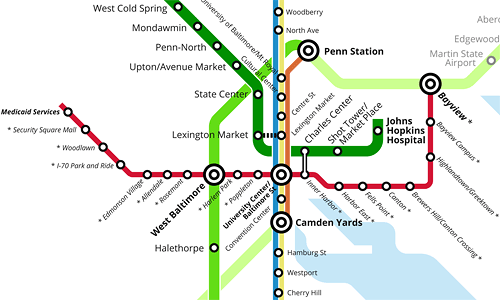On the last day of the Obama presidency, U.S. DOT announced it will investigate whether Maryland Governor Larry Hogan's unilateral decision to cancel the Baltimore Red Line light rail project violates federal civil rights law. U.S. DOT will also look into whether the state's overall transportation spending discriminates against people of color.
The investigation was prompted by a civil rights complaint from the local chapters of the NAACP and the ACLU. Baltimore officials had already sunk $230 million into planning for the $2.9 billion Red Line project, which would have served the low-income west side. But after Hogan was elected, he cancelled the project unilaterally in June, 2015, and shifted the spending to highway projects in more suburban, whiter parts of the state. As a consolation, he offered Baltimore $135 million for bus upgrades.
When the complaint was filed last December, the NAACP Legal Defense and Education Fund said Hogan's decision was part of a "devastating history of transportation decisions that have disfavored African-American residents of Baltimore City."
According to the complaint [PDF], 44 percent of households along the proposed path of the Red Line don't own cars. Compared to current bus routes, the project would would have reduced travel times to some major destinations by about 50 percent. Using the state's own model, the benefits of Hogan's decision to instead spend the money on highways flowed overwhelmingly to white residents at the expense of black residents, according to a transportation economist hired by the civil rights groups.
If the civil rights review finds the state's policies to have a "disparate impact" on disadvantaged populations, U.S. DOT can withhold funding until the problem is corrected. In 2000, or instance, U.S. DOT ruled against Wisconsin Governor Tommy Thompson in a similar situation, and the state was forced to set aside money for the Milwaukee streetcar. In 1996, LA County MTA agreed to spend more on bus service after a civil rights complaint alleged its subway spending overlooked people of color.
Notably, U.S. DOT is not limiting its investigation to the Red Line decision, but will examine transportation planning throughout the entire state, according to Curbed. That's broader in scope than previous civil rights investigations, and could lead to some striking results.
Ajmel Quereshi of the NAACP Legal Defense and Education Fund told Curbed that the Red Line might not get built, but Maryland may have to direct more transportation resources to Baltimore. Despite the transition in the White House, Quereshi expects the investigation to proceed.






